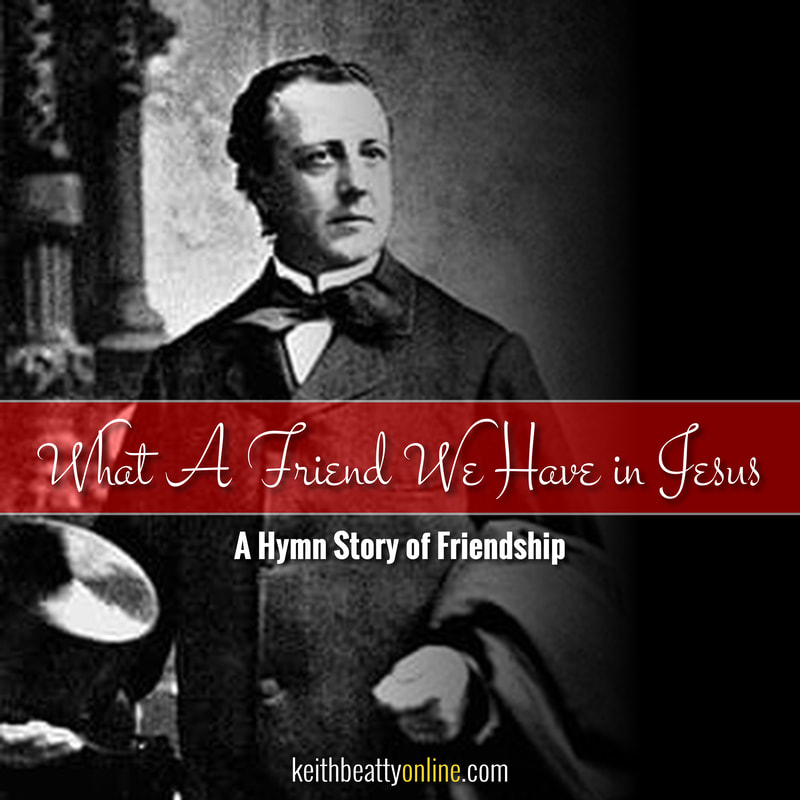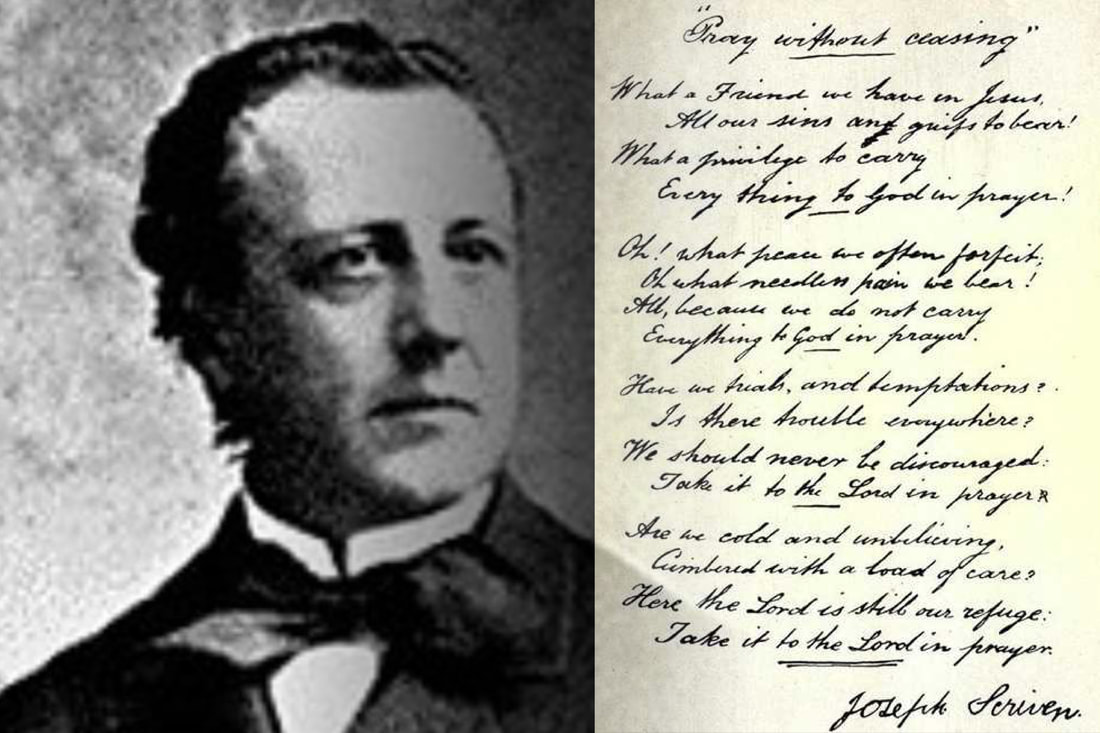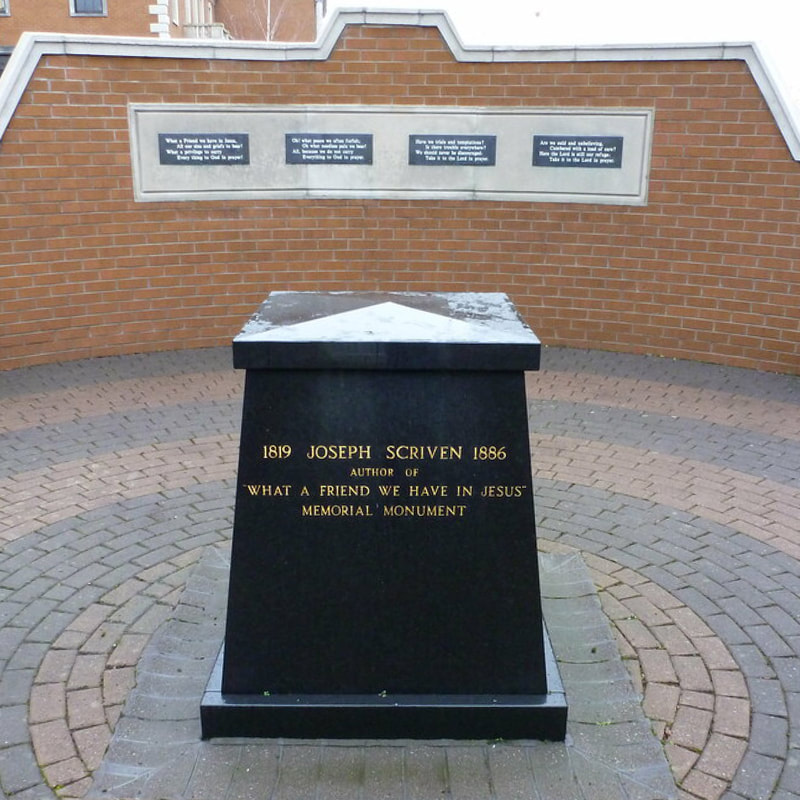|
Joseph Medlicott Scriven (1819-1886) was born in Seapatrick, Ireland and died in Ontario, Canada. He was a man of some wealth and he had the sincere heart of a servant. Joseph was a selfless person by nature, always looking for ways to serve others. He could often be seen walking through the streets of Lake Rice, Canada carrying a saw and sawhorse. Some would attempt to hire him to cut wood, but he would only offer his services for free, to those who could not afford the work. He was born on September 10, 1819, in Ireland to a family of who possessed the financial means to send him to Trinity College in Dublin. He attended classes there before joining the military, training for service in India. Because of poor health, he resigned his military ambitions and returned to Trinity College where he graduated with a bachelor’s degree in 1842. Early in life, Joseph Scriven fell in love. The relationship led to a marriage proposal, which was readily accepted. The preparations for the ceremony were made, and everything was ready. On the evening before the wedding, his fiancé was crossing a bridge over the River Bann. She fell from horse and accidentally drowned. Joseph was on the other side of the river and witnessed the accident; however, he could do nothing but helplessly observe the incident. Full of sorrow and grief, Joseph began to wander. Around the age of 25, he found himself in Woodstock, Canada West (Ontario). Around 1844, Joseph was tutoring students, preaching and working among the impoverished. He would often serve and refuse compensation for his efforts. He was a viewed as a valuable and cherished member of that community. In 1857, he relocated to Bewdley, where he met and fell in love with Elisa Catherine Roche. Their relationship deepened and a wedding was planned. Sadly, in 1860 Elisa died of pneumonia before they could be married. Joseph Scriven’s life was full of tragedy. He was familiar with both love and loss, but he had a relevant relationship with Jesus. At one point, Joseph become ill, and while visiting with him, one of his friends discovered a poem at his bedside. When the friend inquired who had written the poem, Joseph replied, “The Lord and I did it between us.” It was never Joseph’s intention for anyone to see the poem but his mother. He had written the poem out of the pain and grief of his past experiences, and he intended to send it to his mother, who still lived in Ireland, to comfort her in her own sorrows. It’s uncertain how “What A Friend We Have in Jesus” (Pray Without Ceasing) first became published. For many years it was printed with authorship unknown, or incorrectly attributed to Dr. Horatius Bonar. Regardless, it did become known and it became popular. Samuel Caswell (1861-1938) published an early manuscript version that was signed by Scriven. Of the hymn, Caswell stated that it was “beyond question the best-known piece of Canadian literature.” (Macpherson, “Scriven,” n.d.). Stanza 1 is an establishment of the fact that Jesus is our friend, and that He can and will bear our burdens. Stanza 2 asks two rhetorical questions. The are rhetorical because all of us, all of humankind, suffers from “trials and temptations” and become witness to “trouble.” The second stanza then answers the questions in the short refrain, “Take it to the Lord in prayer.” There’s also a third rhetorical question asking, “Can we find a friend so faithful…?” It’s an intimate friendship with the One who indeed “knows our every weakness.” The refrain returns to give the solution, “Take it to the Lord in prayer.” Stanza 3 simply reframes the premise of the song using different questions, “Are we weak and heavy laden, cumbered with a load of care?” And, “Do your friends despise, forsake you?” The answer to all the questions returns with the famous refrain, “Take it to the Lord in prayer.” The song ends with Jesus wrapping His arms around His friend—who is us. Hymnologist Fred Gealy found and additional stanza which was published in Hastings’ Songs of Pilgrimage: A Hymnal for the Churches of Christ (Boston, 1886; Second Ed. 1888) with a fourth stanza, which I will present below: Blessed Jesus, Thou hast promised Thou wilt all our burdens bear May we ever, Lord, be bringing All to Thee in earnest prayer Soon in glory, bright, unclouded There will be no need for prayer Rapture, praise, and endless worship Shall be our sweet portion there Jospeh Scriven died in October of 1886. The Dictionary of Canadian Biography describes all that we know about the circumstances of his death: His last days were clouded with ill-health and despondency. James Sackville, his friend and fellow-believer, found Scriven ill and brought him to his house. One hot night in 1886, Scriven left his bed without disturbing anyone, probably to drink at a nearby spring: some hours later, presumably having fainted or fallen, he was found dead in the spillway of Sackville's grist-mill, a few feet from the spring. He was buried in the Pengelly burial-ground in an unmarked grave between Eliza Roach and Commander Pengelly. (Macpherson, “Scriven,” n.d.). Only a few days before Scriven’s death, Sackville encountered Scriven thoroughly dejected. At this meeting, Scriven told his friend that, “I wish the Lord would take me home.” (Cleland, 1895, p.17) It was never fully determined if Scriven’s death was natural, accidental or a suicide. Jesus was a friend to Joseph Scriven, and it was obvious that through a lifetime of service to God, Scriven experienced some deep tragedy. If the closing thoughts of his life are recorded correctly by Scriven’s friend, then Jesus did indeed come and take him home. Like many other disciples of Christ who have gone on before us, including my own father only a few months ago, Scriven now understands more deeply about the friendship of Jesus and the magnificent “Precious Savior” who is “our refuge.” And, as the mostly unpublished fourth stanza puts forth, they are all involved in “praise and endless worship,” which is “out sweet portion there.” Sources: Jay Macpherson, “Scriven, Joseph Medlicott,” Dictionary of Canadian Biography (Vol XI (1881–1890) James Cleland, What a Friend We Have in Jesus and Other Poems by Joseph Scriven with a Sketch of the Author (Port Hope: W. Williamson, Publishers, 1895)
1 Comment
Betty mccord
2/7/2023 04:17:25 pm
I enjoyed this
Reply
Leave a Reply. |
AuthorKeith Beatty is a Worship, Missions and Media Pastor living in North Alabama. He's excited and very humbled to be a follower of Jesus Christ! Archives
April 2023
Categories |




 RSS Feed
RSS Feed